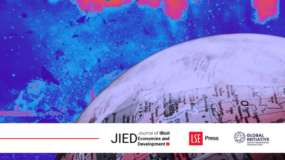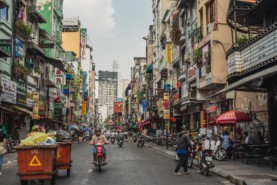This special issue aims to explore how the war in Ukraine which started with the illegal annexation of Crimea by Russia in 2014 and entered a new phase with Russia’s full-scale invasion on 24 February 2022 has altered the criminal landscape in the region. The war caused disruption and provoked a displacement crisis of a scale not seen in Europe since World War II. It put the population of over 43 million under stress and inflicted a shock on the country’s licit and illicit economies. While the war initially caused significant disruption to the highly sophisticated and entrenched organized crime landscape in both Ukraine and Russia, shifted the established smuggling routes, and forced many criminal actors to emigrate, it soon enough presented new opportunities for criminal enrichment.
With the population on the move, millions of Ukrainian refugees and internally displaced persons (IDPs) became vulnerable to sexual and labour exploitation at the hands of human traffickers. Despite the awareness of the international community on the risks associated with mass displacement and the swift action on behalf of the EU to grant protection and legal status to Ukrainian refugees, much remains to be understood about the extent to which human smuggling and trafficking networks were able to take advantage of the mass exodus of the Ukrainians from the war-torn country. And in Ukraine, the divided capacity and distracted attention of law enforcement allowed malicious actors to operate more freely and quickly adapt to the new environment. The production of synthetic drugs was not halted but simply moved to the west of the country. The wartime economy prompted the emergence of new markets around humanitarian aid and the smuggling of conscripts. Drugs and weapons began flowing toward the front line in the east.
While the end of the war will stop much of human suffering, death, and destruction, it may bring with itself further risks. As the war continues, so does the accumulation of weapons on Ukrainian territory, risking the emergence of a black market of arms and ammunition outside direct state control once the war is over. Some illicit economies, such as the smuggling of humanitarian aid, may become redundant once military operations cease, but the end of the war will not put an end to the host of illicit economies, which will have developed and matured during the conflict. This call for papers therefore aims to enhance the understanding of the criminal adaptation in the context of the war in Ukraine – and the potential implications for the post-war criminal ecosystem in Ukraine and the broader region.
In order to offer a broad empirical, qualitative approach, we welcome contributions from various disciplines, including (but not exclusively) sociology, economics, anthropology, history and international relations, as well as policy analyses from activists, NGO leaders, or practitioners. We particularly encourage submissions by female scholars and contributions from Ukrainian authors. We may be able to provide language and translation support for original contributions not in English.
Цей спеціальний випуск має на меті дослідити, як війна в Україні, яка розпочалася 2014 року з незаконної анексії Криму Росією та вступила в нову фазу із повномасштабним вторгненням 24 лютого 2022 року, змінила кримінальний ландшафт у регіоні. Війна дезорганізувала суспільство та спровокувала кризу вимушеного переселення такого масштабу, якого Європа не бачила з часів Другої світової війни. Вона поставила понад 43-мільйонне населення у вкрай важке становище і завдала удару як по легальній, так і нелегальній економіці країни. Не дивлячись на те, що попервах війна спричинила значний злам у високорозвиненій і вкоріненій структурі організованої злочинності як в Україні, так і в Росії, змінила усталені маршрути контрабанди і змусила багатьох злочинців емігрувати, вона доволі швидко відкрила нові можливості для злочинного збагачення.
У результаті масового виїзду населення, мільйони українських біженців та внутрішньо переміщених осіб (ВПО) стали вразливими до сексуальної та трудової експлуатації з боку торговців людьми. Незважаючи на усвідомлення міжнародним співтовариством ризиків, пов’язаних з масовим переміщенням, і швидке реагування з боку ЄС в контексті надання захисту і правового статусу українським біженцям, досі немає визначеності, якою мірою мережі контрабандистів і торговців людьми змогли скористатися масовим виїздом українців з охопленої війною країни. Тим часом, в самій Україні розпорошеність сил і засобів та розсіяна увага правоохоронців дозволили зловмисникам діяти більш вільно і швидко адаптуватися до нових умов. Виробництво синтетичних наркотиків не припинилося, а натомість перемістилося на захід країни. Економіка воєнного часу сприяла появі нових ринків, зокрема, незаконного розподілу гуманітарної допомоги та нелегального перевезення ухилянтів від мобілізації. Наркотики та зброя почали надходити до лінії фронту на сході країни.
Незважаючи на те, що закінчення війни покладе край значній частині людських страждань, смертей і руйнувань, воно може спровокувати появу нових ризиків. Поки триває війна, відбувається накопичення зброї на українській території, що загрожує виникненням чорного ринку зброї та боєприпасів поза прямим державним контролем у повоєнний період. Деякі види нелегальної економіки, такі як контрабанда гуманітарної допомоги, можуть втратити свою актуальність після припинення воєнних дій, але закінчення війни не покладе край існуванню цілої низки нелегальних галузей економіки, які розвинулися і зміцніли під час конфлікту. Таким чином, оголошений прийом статей має на меті поглибити розуміння кримінальної адаптації в контексті війни в Україні та її потенційних наслідків для повоєнної кримінальної екосистеми в Україні та сусідніх з нею державах.
З метою запропонувати широкий емпіричний, якісний підхід, ми вітаємо матеріали з різних дисциплін, зокрема (але не обмежуючись), соціології, економіки, антропології, історії та міжнародних відносин, а також політичні аналізи від активістів, лідерів неурядових організацій або фахівців-практиків. Ми особливо вітаємо роботи жінок-науковців та українських авторів. В окремих випадках ми маємо можливість надати послуги з перекладу неангломовних оригінальних матеріалів.



